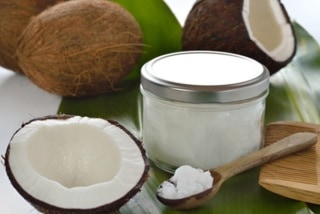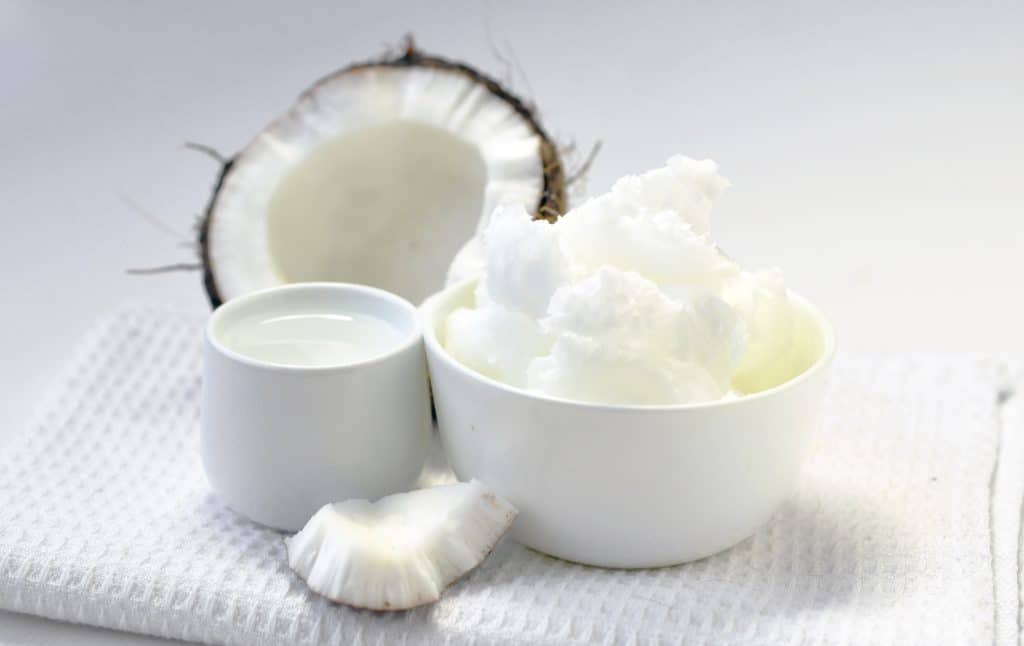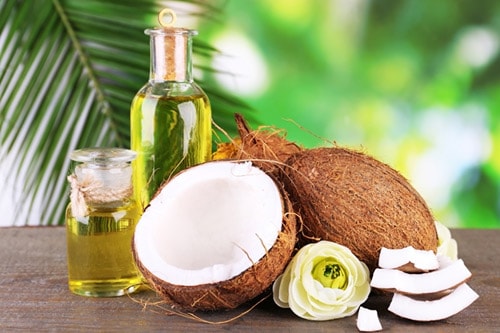Coconut oil is often called a super food and with good reason. Coconut oil has been used for thousands of years in traditional medicine to treat everything from skin problems and digestive issues to a natural energy boost and weight loss.
Coconut oil has also been studied in more than 1,500 clinical trials to investigate its benefits for eczema, Alzheimer’s disease, high blood pressure, Candida infection, and weight loss. Over the last decade, researchers have uncovered dozens of benefits to this healthy oil.
You can use coconut oil yourself as a lip balm, in homemade skin treatments, as a massage oil, and as a supplement. You can also use coconut oil for hair treatments and styling. Here’s what you should know to use coconut oil for the greatest benefit.
Medium-Chain Fatty Acids (MCFAs) in Coconut Oil
Coconut oil is rich in healthy fats known as medium-chain fatty acids or MCFAs. These fatty acids include:
- Capric acid
- Lauric acid
- Caprylic acid
About 62% of the oils in coconut are comprised of MCFAs while 91% of the total fat in coconut oil is considered healthy saturated fat. While most fats take awhile for the body to digest, MCFAs go through a more simple three-step digestive process to become fuel compared with some long-chain fatty acids in plant-based oils that can take 26 steps to convert to fuel.
MCFAs are not readily stored as fat by the body and easier to digest. They also have antifungal, antiviral, and antimicrobial properties.
Coconut Oil Weight Loss Benefits
There are numerous coconut oil weight loss benefits that are backed by science with evidence that coconut oil can help boost the metabolism and shed unwanted fat. The use of coconut oil to lose weight goes against the commonly held belief that all fat is bad and causes weight gain, but the truth is it’s hydrogenated fats that lead to excessive caloric intake and high cholesterol. Fats are part of a healthy diet and used by the body to produce hormones, but not all fats are equal.
The research on the use of coconut oil for weight loss goes back many years with one study published in a 1985 issue of the Journal of Toxicology and Environmental Health that found a single injection of capric acid — found in coconut oil — resulted in quick initial then a gradual decline in food consumption and a loss of body weight in rats.
Another study published in the American Journal of Clinical Nutrition found that people lost more weight when medium-chain triglycerides or MCTs, such as those found in coconut oil, were included in their diet. This study went so far as to find that people lost more weight by including MCTs were in their diet than with olive oil. The study concluded that changes in the quality of fat intake could be useful in boosting weight loss.
A more recent study conducted at the McGill School of Dietetics and Human Nutrition tested an oil made with medium-chain triglycerides on adults who were 25 pounds overweight. The oil included coconut oil, flaxseed oil, and olive oil. The study concluded that MCT oil is broken down by the liver and burned as energy, not stored as fat, and boosts metabolism, which is essential for maintaining a healthy weight. Over the course of the 1-year study, men lost an average of 1 pound per month while female study participants had heightened metabolic rates.
This study also found that the MCT oil significantly reduced cholesterol levels by more than 13% compared to olive oil, which reduces cholesterol by 4.5%. Peter Jones, the study’s lead author, called the results impressive as “olive oil was considered the best cholesterol fighter until now.”
A recent study published in Obesity Research Journal gave some insight into why medium-chain fatty acids improve metabolism and fat-burning. To test the effects of MFCAs on the breakdown of fat, researchers pre-treated fatty adipose cells in rats with caprylic acid. They found that the fat cells broke down at a significant level that mimicked fasting, which occurs when the body uses energy reserves as effectively as possible and speeds the breakdown of unnecessary fat reserves.

Losing Weight with Coconut Oil
A single tablespoon of coconut oil contains 130 calories of fat, which means the 2 suggested tablespoons per day will add 260 calories of fat to your caloric intake per day. While this is beneficial fat, it’s still important to watch other sources of fat intake to avoid exceeding your suggested caloric intake. Be sure you reduce your total calories from other sources to maintain a daily caloric intake that is lower than what you normally consume.
There are several ways to add coconut oil to your diet to boost your weight loss efforts. In addition to replacing vegetable oil and olive oil with coconut oil when cooking, try adding a tablespoon of coconut oil to a pre-workout drink or your morning coffee.
Teeth and Gums
Coconut oil pulling can be used to improve the strength and health of your teeth. It removes harmful Streptococcus Mutans bacteria that over time can damage your teeth and gums. You can use this safe and natural product daily to improve your oral health.
Coconut Oil and Skin Care
The are many benefits of coconut oil for skin. Coconut oil is a common base ingredient in skin care products like creams, lotions, and soaps because it can help soothe skin and prevent dryness. It can also help in the treatment of many skin conditions like eczema, dermatitis, psoriasis, and even acne.
Acne
Little research has been done into whether coconut oil can help treat acne, although the medium-chain fatty acids in coconut oil do have known antimicrobial properties. Coconut oil is naturally high in lauric acid, which has anti-bacterial properties that can help kill the bacteria responsible for acne. On its own, lauric acid has been demonstrated to kill P. acnes, the bacteria that causes acne.
One study found that lauric acid was even more effective at killing acne-causing bacteria than benzoyl peroxide, a common acne treatment, and it may help with the inflammation the bacteria causes.
Dermatitis
Dermatitis refers to inflammation of the skin and it can be a sign of a staph infection. Coconut oil has been found to reduce staphylococcal colonization on the skin. In a randomized controlled study, coconut oil was found to clear 95% of staphylococcal colonization in people with atopic dermatitis without the use of antibiotics.
Psoriasis and Eczema
Eczema and psoriasis are common skin problems that can result from many possible causes. Coconut oil is rich in antimicrobial and antibacterial fatty acids that can help soothe skin during a flare-up and reduce inflammation. The lauric acid and capyrlic acid in coconut oil also help to reduce flaking and itching while nourishing the skin.

Heart Health and Coconut Oil
Coconut oil’s heart health benefits are somewhat controversial as it does contain saturated fats. Still, research has shown that the lauric acid in coconut oil helps prevent issues that can cause heart disease, particularly high blood pressure and high cholesterol.
Coconut oil is believed to be better than vegetable oils at lowering blood pressure because it contains medium-chain fatty acids. The polyunsaturated fats like Omega-6 fatty acids in vegetable oils cause blood vessels to constrict, but the Omega-3 fatty acids in coconut oil appear to widen blood vessels while relieving inflammation.
Several studies have also demonstrated coconut oil can help lower cholesterol levels. One study conducted at the University of Kerala found that virgin coconut oil can reduce total cholesterol levels, phospholipids, LDL (bad) cholesterol, and triglycerides. Researchers also found that it can boost good HDL cholesterol levels. Another study in women found that coconut oil reduced total and LDL cholesterol while boosting HDL cholesterol when compared to soybean oil.
Alzheimer’s Disease and Coconut Oil
Alzheimer’s disease is a common form of dementia that affects an estimated 5.5 million Americans. About 1/3 of seniors today die with Alzheimer’s or another form of dementia and it kills more people than breast cancer and prostate cancer combined.
Researchers have observed that Alzheimer’s patients often have a reduced ability to utilize glucose or sugar for energy in certain areas of the brain. This is similar to the problem diabetics face when their bodies fail to produce the insulin necessary to move sugar into cells.
The link between diabetes and Alzheimer’s has even become strong enough for some medical researchers to call Alzheimer’s “type 3 diabetes.” While Japanese researchers have found that diabetics are at a higher risk of dementia, even when the disease is managed well, researchers have also found that people with mild Alzheimer’s experience a boost in memory function after receiving insulin.
It has been speculated that ketones can offer an alternative source of energy to these malfunctioning brain cells to potentially reduce Alzheimer’s symptoms. Ketone bodies are a biological byproduct of the digestion process of coconut oil and these ketone bodies are one of the few alternative fuel sources available to brain cells when glucose can’t be used efficiently, as is the case with Alzheimer’s patients.
Ketones are not naturally produced by the body in high levels except through a diet that is extremely low-carb. Consuming coconut oil, however, can create a temporary state of hyperketonemia which boosts the number of ketone bodies in the blood.
One 2006 study found that consuming medium-chain triglycerides resulted in immediate improvement in brain function in people who had milder forms of the disease. Other studies have supported these findings.
Coconut Oil and UTIs
While the modern approach to treating urinary tract infections (UTIs) is the use of antibiotics, the medical field is also concerned about the overuse of antibiotics and an increasing number of drug-resistant forms of bacteria. Coconut oil may be a potential treatment for the urgency, frequency, and painful urination associated with a UTI.
Urinary tract infections occur when E. coli gets into the bladder or kidney and multiplies. The medium-chain fatty acids in coconut oil function as a natural antibiotic to disrupt the coating on E. coli and kill the bacteria cells. One study even found that coconut oil works to directly protect the liver from damage.
Inflammation, Arthritis, and Coconut Oil
By 2040, it’s estimated that 78 million adults in the U.S. (or 26%) will have arthritis. The risk of arthritis increases with age and it’s the leading cause of disability among adults.
Coconut oil may be an effective remedy for inflammation and arthritis. According to a study conducted in India, the antioxidants in virgin coconut oil were found to be more effective than leading medications at treating arthritis and inflammation.
Another recent study found that coconut oil may be an effective remedy for relief from the symptoms of rheumatoid arthritis (RA) without the side effects of prescription medications that are not very effective. This study involving lab rats found that a formulation made from coconut oil was more effective at reducing chronic inflammation of the joints than a pharmaceutical NSAID.
Anti-Viral and Anti-Bacterial Benefits of Coconut Oil
The lauric acid in coconut oil has natural antiviral properties that were discovered by Dr. Kabara, a professor at the Universities of Detroit and Michigan. He was also responsible for discovering the immune system-boosting properties of the fatty acids in breast milk, which is also high in lauric acid.
Dr. Kabara’s work led to the discovery that lauric acid is converted into a monoglyceride known as Monolaurin, which fights germs and works against bacteria, viruses, and protozoa. Monolaurin can deactivate HIV, hepatitis C, the herpes simplex virus, and the measles virus in a lab setting. It’s also effective at fighting two particular forms of bacteria: Listeria Monocytogenes which causes Listeriosis and Staphylococcus Aureus, which causes Toxic Shock Syndrome, cellulitus, impetigo, and other infections. Monolaurin works by liquifying the fatty membrane of the virus cells. In bacteria, it disrupts their ability to form toxins.
According to Dr. Kabara’s research, the lauric acid in coconut oil only shows these effects when it is broken into monoglycerides before it’s digested. Breast milk naturally contains an enzyme that breaks lauric acid into Monolaurin.
Candida Yeast Infections and Coconut Oil
Candida is the most common type of yeast that’s found in the intestinal tract, mouth, and vagina and it’s a common cause of fungal infections of the skin and mouth. Yeast infections, including thrush, a yeast infection of the mouth that typically affects newborns, are usually treated with anti-fungal medication, but research indicates that the active ingredients in coconut oil may be just as effective.
Researchers at the Center of Oral Health at the University of Kentucky found that lauric acid and caprylic acid in coconut oil are effective at killing 3 strains of candida. A similar study published in Antimicrobial Agents and Chemotherapy found that capyric acid was the fastest and most effective way to kill three strains of candida.

Choosing a Coconut Oil Product
Coconut oil comes in many types and levels of quality, just like olive oil. Coconut oil can be categorized as virgin, organic, extra-organic, refined, and unrefined. In general, virgin and organic coconut oil are best. Regular or refined coconut oil is usually produced from pieces of coconut meat or copra that is dried in the sun before it is sent to factories where chemicals are added to leach out the oil. High temperature is used to liquefy and purify the oil. Refined coconut oil usually has no flavor or coconut scent and it’s primarily used for cooking.
Virgin or organic coconut oil is made from fresh coconuts. The coconut meat is typically hand-pressed and the milk is fermented to produce a rich coconut oil. Virgin coconut oil is not exposed to high heat for a more pure product with higher levels of lauric and capyrlic acid that can be damaged in intense heat.
There is generally no difference between virgin and extra-virgin coconut oil, however. As you compare brands, consider the following:
- Is it refined, deodorized, or bleached? Most coconut oils that are deodorized, bleached, or refined do not offer the same health benefits and there is no way to know how much of the healthy fatty acids remain after the intense manufacturing process and chemical exposure.
- Is it certified organic? A product that has been certified organic by the USDA ensures it has not been processed with additives, artificial fertilizers, or pesticides.
- Are there hydrogenated fats or trans-fatty acids? A coconut oil with hydrogenated or trans-fatty acids can increase the risk of heart disease.
- How was it processed? Look for a coconut oil that was expeller-pressed, fermented, or cold-pressed. Expeller-pressed involves placing the raw coconut meat into a press to extract coconut milk that is fermented and passed through centrifuges to separate the milk from the oil. Cold-pressed involves using grated fresh coconut meat that is dehydrated at a low temperature that is pressed to produce oil. Fermentation is an older process that involves mixing the coconut meat with water and allowing it to ferment to produce curd and oil on the surface.
Cooking With Coconut Oil
It’s usually recommended to eat 3-4 tablespoons of coconut oil per day for ideal results. There are many ways to add coconut oil to your diet, including using it as a cooking oil, replacing butter in recipes, or adding it to coffee or smoothies. Here’s a guide for using coconut oil in the kitchen.
Unrefined or organic coconut oil has a very strong coconut aroma and flavor which can add interest to your meals. This makes it easy to use coconut oil in recipes that already incorporate coconut milk or coconut flakes, including many baked goods and Thai recipes.
Storing Coconut Oil
Coconut oil is best kept in a cool area out of direct sunlight. It has a very low melting point of 78 degrees. When coconut oil is kept in an environment warmer than this, it becomes a liquid, but it can easily be converted back to solid form by chilling it. When using room temperature coconut oil, stir it before scooping it to mix in the floating solid material on top. When you are measuring chilled coconut oil, spoon it into a measuring cup and pack it down for an accurate measurement.
Stir-Fry and Saute with Coconut Oil
Cooking with coconut oil is easy; simply use it in place of the type of oil called for in your favorite recipe. You can use higher heat than you can with olive oil without the coconut oil burning, but you should still watch for the oil to begin smoking or turning gray or white, which means it’s been overheated. Virgin coconut oil has a smoke point around 350°F and refined coconut oil can withstand temperatures of up to 450°F.
Baking with Coconut Oil
Coconut oil is often used in vegan baking recipes because it can easily replicate the role of butter. The high saturated fat content of coconut oil is similar to the profile of butter which means it can even be used in pastry recipes. You can also use solid or refrigerated coconut oil pulsed into pie crust and dough batter as you would butter.
When you are replacing butter with coconut oil, use about 25% less butter than the called-for amount of butter because coconut oil is almost pure fat and a little goes a long way. You can add just a bit of extra liquid to accommodate for the moisture that butter would give off as it melts.
Other Ways to Use with Coconut Oil
Here are some final ideas for using coconut oil in the kitchen:
- Drizzle on lobster or popcorn. Like golden butter, coconut oil has a very sweet and slightly buttery flavor when it’s heated.
- Toss veggies with coconut oil and roast as usual. This will produce a crisp texture and delicious caramelized flavor.
- Rub chicken with coconut oil and seasonings before roasting.
- Add a spoonful of coconut oil to your favorite smoothie.
- Replace the butter in your pancake recipe with coconut oil.
- Pan-fry fish with coconut oil for a tropical flavor.
- Melt chocolate with coconut oil to create chocolate shells over ice cream or bananas.
With the many benefits and uses for coconut oil. It’s time to add this amazing food to your diet and get rid of all the processed oils. So that you can start living a healthier lifestyle today.


[…] Coconut oil is an amazing substance that can be used in many different ways. This article will show you some handy household uses for coconut oil. […]
[…] Coconut oil has quite a few health advantages. It comprises medium-chain saturated fatty acids, which is a healthy type of saturated fat in comparison with trans fat. This kind of fat is more easily digested and transformed into power for the brain and body. […]
[…] we now learn is that dogs can benefit from coconut oil as well! Continue reading to find out how coconut oil can be used to enhance the health of your […]
[…] Massage oil: combine 2 to 3 drops with olive, grape seed, or coconut […]
[…] be mindful of the oils you cook with. Many of us recognize the benefits of cooking with coconut oil or using olive oil in recipes. However did you know that there are a number of essential oils that […]
[…] to three times daily, for about 10 minutes. For added benefits, you can combine tea tree oil with coconut oil applying each night before […]
[…] good rule of thumb is 3-5 drops of essential oil per teaspoon of oil. Coconut oil is an excellent choice as it is also anti-fungal. Simply combine one of the above anti-fungal […]
[…] Coconut oil is rich in vitamins, minerals, and carbohydrates. Aside from coconut oil hair treatment, it is also used in the preparation of cosmetic creams and soaps. It is also used as an ingredient for various dishes in Asian countries. […]
[…] your teeth and gums. It is very popular among those who opt for organic, all-natural products, as coconut oil is edible, safe and derived from the ‘meat’ of mature coconuts. Due to this, however, there has […]
[…] of fatty acids in coconut oil have excellent health effects of everything they encounter. Coconut oil can be used for a variety of things, including improving brain functionality and weight loss. You […]
[…] has been written about the awesome benefits of adding coconut oil to your diet/food regimen. How it provides the body with enough energy because of the good fats […]
[…] Coconut oil is produced from cold-pressed coconut kernels. It contains lauric acid, a type of fatty acid that has been shown to reduce: […]
[…] acne. By the way, toxins are what weakens the liver and makes the skin oily and prone to acne. Coconut oil “knows” that very well and, therefore, the first thing you do to help treat your acne […]